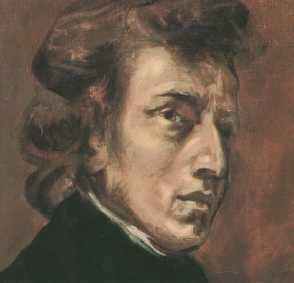![Piano's Solo Corner [Image]](piano8b.gif)
![Piano's Solo Corner [Image]](piano8b.gif)

| Date/Place of Birth: | 1st March, 1810 at Zelazowa Wola near Warsaw, Poland. |
| Personality: | A handsome and courteous gentleman. With his pale and frail appearance, he was physically weak as the result of the tuberculosis, a lung disease. Besides that, he was reserved and very sensitive to people's reaction. |
| Piano-Playing Style: | There are two important features of Chopin's piano-playing style: rubato and
classical basis. In term of rubato, Chopin played the main melody, usually the right-hand part, in a hesitant but very free
manner. As a result, the melody tends to be slowed down a bit or accelerated. In other word, rubato means a feature of performance
in which strict time is 'robbed' from some notes in order to give others the time to be played slowly. This style of playing
has enhanced the expression of the particular melody. Despite Chopin's supreme rubato and romantic style, classical basis was very important
to Chopin. In this style, he would play in strict time with a menotrome on his piano and smoothly (legato).
Physically, his delicate hands would play the melody singing and touching with very flexible wrists. He also used sustaining pedal skillfully to enhance the singing tone as well as invoke the dramatic sense. Though Chopin was a piano virtuoso, he disliked playing at public concert as he was very sensitive to the crowds. Indeed, he preferred to play in small salons frequented by the nobility. |
| Music: | Generally, Chopin's music was very influenced by his favourite composers, J.S.Bach and Mozart. This
indicates that his works sound in tonality way. Chopin's music is very highly imaginative and pianistic. His piano works are composed solely
for the piano unlike the piano works by Beethoven or Clementi that could be transribed into other forms like orchestral work, chamber work etc.
Chopin brought revolutionary to the piano music by taking inspiration from the singing human voice and transferred into most of his works. Other
than the singing and poetic music, it sometimes contained dissonances and thick harmonic structure that produced a rich, powerful sonority. Therefore,
it was Chopin who made the piano popular: a singing instrument; an instrument of infinite color and poetry; a heroic instrument; an intimate instrument.
Besides that, Chopin's music also showed awesome virtuosity like Liszt's. That was why Schumann declared Chopin's music as "Guns buried in flowers." Chopin composed "absolute" music indicated that he only gave abstract titles to his music. Therefore, he was different from other composers like Schumannn who always gave descriptive titles to his music. Even though his four ballades were considered that each contained a story behind it. But, Chopin never wrote anything about that. |
| Composing Habit: | Chopin was not a fast composer like Mozart. However, while at the keyboard, his melodic ideas came fast and he would play and improvise continuously until he completed it as a piece. Then, when he started to compose, he did it with great care, thinking back the original ideas that had been played recently, fitting them into proper form, keeping on altering and refining the phrases until he satisfied with it. In conclusion, Chopin always improvised new piece on the piano before he composed it. That was why at that moment, his published works contained several versions. |
| Chopin's Quote: | "The three most celebrated doctors on the island have seen me. One sniffed at what I spat, the second tapped where I spat, the
third listened as I spat. The first said I was dead, the second said I'm dying, the third said I'm going to die." Chopin, disappointed with incompetent doctors in Majorca, 1839 "I don't like to play in public. The crowds frighten me, their breath stifles me, their stares petrify me, their strange faces throw me into confusion," "Play Mozart's Requiem in memory of me," "Liszt is playing my etudes and transporting me outside of my respectable thoughts. I should like to steal from him the way to play my own etudes." "One needs only to study a certain positioning of the hand on the piano to attain the most beautiful quality of sound, to know how to play long notes and short notes, and with
supple dexterity." "In order to attain naturalness in performance, one needs to hear good singers and learns to sing." |
| Chopin's Death: | While Chopin lied on his bed, Solange, George Sand's daughter; Louise, his sister and Princess Marcelline, a friend of the family were at his bedside. Finally, Chopin died on the next morning of 17 October, 1849, at the age of 39. |